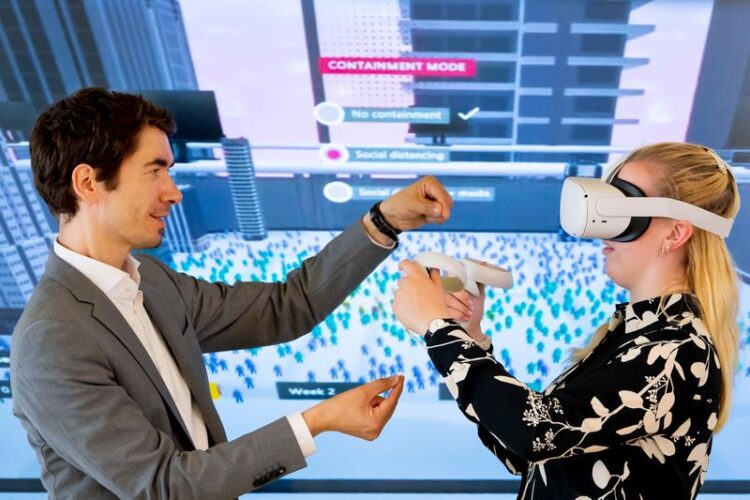The virtual classroom

Prof. Alexander Gröschner with a test person during an experiment in virtual reality
Image: Jens Meyer/Uni Jena
Educational scientists at the University of Jena study the use of VR headsets in teacher training.
Educational scientists at Friedrich Schiller University Jena are working on a new project studying how virtual reality can enrich teacher training – and thus also enhance teaching in schools.
Digital learning has received a lot of attention and valuable input during the coronavirus pandemic, both in schools and universities. This topic must now be pursued further to develop, test and ultimately apply new methods. Educational scientist Prof. Alexander Gröschner of the University of Jena is conducting the first transnational study on this subject, together with colleagues from Finland, Israel, Turkey and the USA. The researchers are supported by the European Association for Research on Learning and Instruction (EARLI) and the Jacobs Foundation.
“We want to find out how the processing of tasks in virtual reality – in which prospective teachers immerse themselves by means of a headset and two controllers – affects learning success and the regulation of emotions during learning,” explains Prof. Gröschner. “For example, total immersion in a learning environment can ensure that students – but in future also pupils – are better able to focus on content and are less easily distracted.”
Virtual spread of viruses
For the study, participants – primarily student teachers – enter virtual reality using VR headsets and take in learning content from the STEM area, i.e. from subjects such as biology, chemistry and mathematics. For example, using a program developed at the Massachusetts Institute of Technology, they can visually track the exponential spread of SARS-CoV-2 at a virtual workstation and, with the help of integrated tools, calculate which infection figures – depending on compliance with the protective measures – are linked to the spread. While they are doing this, the researchers led by Prof. Gröschner observe how the participants move in the virtual space, where they look, how they orientate themselves and which aids they use. Through subsequent interviews and questionnaires, the scientists then record the personal impressions of the participants in the study and gain an understanding of the mental stress caused by the unfamiliar environment.
“The use of VR headsets has several advantages when it comes to the training of future teachers,” Gröschner explains. “For example, a simulated classroom allows them to have more practical experience, to test areas such as classroom management in a more lifelike way. Mistakes are easier to understand and evaluate.” In addition, the students reduced their fear of digital methods and gain skills that will be needed in future.
Digital tools enable individual support
VR headsets in schools could definitely become a reality. “As a supplementary method, they have the potential to enrich the teaching process,” says Prof. Gröschner. “Experiments – for example in chemistry lessons – can be understood much more easily, regardless of the location. In addition, the teachers can integrate everyday experiences much more easily in a gamebased form.”
As well as simply conveying content, teachers can also use such digital tools in differentiation, to cater more to the various performance levels of pupils.
“If nothing else, teaching during the pandemic has shown that we have to take a closer look at who needs what support,” says Gröschner, who is also on the jury of the German School Award. “The use of VR headsets is an example of personalised methods that also provide the teaching staff with information about each individual pupil.” As the technical devices are by now quite affordable, their use in classrooms is no longer a utopian dream – provided that the teachers know how to use them.
Wissenschaftliche Ansprechpartner:
Prof. Alexander Gröschner
Institute of Educational Sciences at Friedrich Schiller University Jena
Am Planetarium 4, 07743 Jena, Germany
Tel.: +49 (0)3641 / 945351
E-mail: alexander.groeschner[at]uni-jena.de
Media Contact
All latest news from the category: Science Education
Newest articles
Faster, more energy-efficient way to manufacture an industrially important chemical
Zirconium combined with silicon nitride enhances the conversion of propane — present in natural gas — needed to create in-demand plastic, polypropylene. Polypropylene is a common type of plastic found…

Energy planning in Ghana as a role model for the world
Improving the resilience of energy systems in the Global South. What criteria should we use to better plan for resilient energy systems? How do socio-economic, technical and climate change related…

Artificial blood vessels could improve heart bypass outcomes
Artificial blood vessels could improve heart bypass outcomes. 3D-printed blood vessels, which closely mimic the properties of human veins, could transform the treatment of cardiovascular diseases. Strong, flexible, gel-like tubes…





















